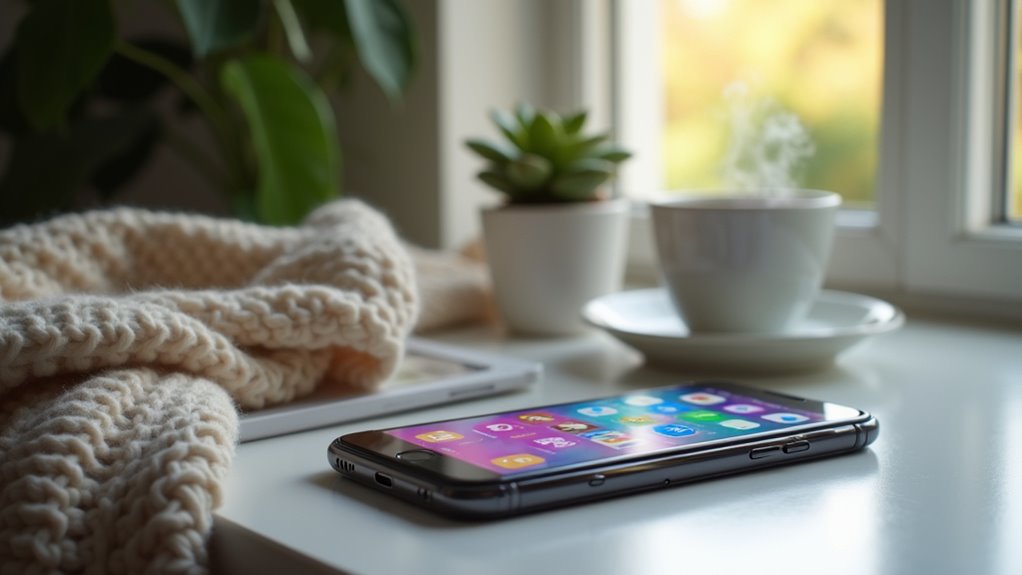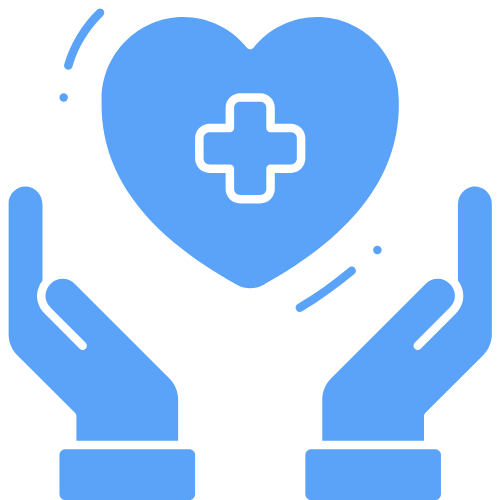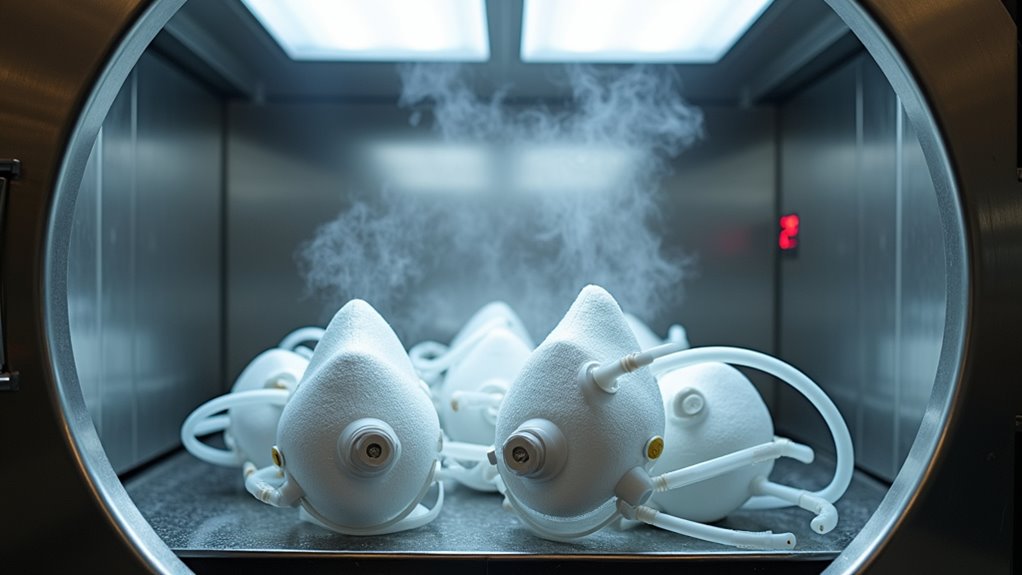AI-powered mental wellness apps are revolutionizing psychological support in 2025, with platforms like BetterHelp, Talkspace, and Youper leading the transformation. You’ll find sophisticated personalization systems that analyze your usage patterns and emotional states, delivering targeted therapeutic interventions with 80% higher engagement rates. While Headspace and Calm offer structured mindfulness practices, newer solutions like Clare&me and Limbic provide AI companions for continuous support. The evolving terrain of mental health technology presents compelling opportunities to bolster your emotional wellbeing.
The Future of Mental Wellness Apps

While traditional therapy remains foundational to mental healthcare, AI-powered mental wellness apps are rapidly transforming how we approach psychological support. You’ll find 24/7 chatbot assistance integrating with hybrid human-AI systems, creating a comprehensive support network that bridges gaps in counselor availability. With proactive wellness becoming increasingly important to modern patients, these digital solutions empower users to take charge of their mental health journey. Platforms like Clare&me and Limbic now offer empathetic AI companions for continuous therapeutic guidance. The industry’s remarkable 25.9% annual growth demonstrates unprecedented demand for digital mental health solutions.
These digital platforms now incorporate robust data governance to protect your sensitive information while delivering personalized care through digital twins and emotional monitoring. The integration of VR therapy and gamified wellness activities improves engagement, while ethical AI deployment guarantees balanced support without over-reliance on automated systems. You’ll benefit from real-time health insights and predictive analytics that enable early intervention, all while maintaining connection with human therapists through video-based teletherapy platforms. This technological evolution marks a significant shift toward more accessible, data-driven mental healthcare solutions.
Essential Features Driving User Success
Your mental health expedition becomes more effective through AI-powered personalization systems that continuously analyze your usage patterns, emotional states, and behavioral markers to deliver precisely calibrated interventions. Modern crisis response tools integrate seamlessly with these AI systems, monitoring for warning signs and automatically activating appropriate support protocols when needed. The combination of these features creates a sturdy safety net, connecting you instantly to emergency services, crisis hotlines, and personalized safety plans while maintaining HIPAA-compliant data security standards. Research demonstrates that personalized experiences drive an 80% increase in user engagement with mental health services. The apps facilitate enhanced treatment outcomes by offering real-time tracking of symptoms and mental health screening capabilities.
Personalized AI Support Systems
Virtually every successful mental health app in 2025 relies on sophisticated AI-driven personalization systems to deliver targeted therapeutic support. Through adaptive therapeutic engagement, these platforms analyze your behavioral patterns, biometric data, and emotional responses to create distinctly customized intervention strategies. Creative community therapies and non-clinical resources are seamlessly integrated into personalized treatment plans to enhance recovery outcomes.
The multisensory intervention customization integrates data from wearables, voice analysis, and daily activity tracking to adjust your therapeutic exercises in real-time. You’ll receive dynamic content recommendations based on your progress, cultural context, and specific mental health needs. The AI systems account for your sleep patterns, stress triggers, and social interactions while monitoring potential risk factors through natural language processing. These innovations have made mental health accessible to millions who previously faced barriers due to cost and location. When necessary, they’ll escalate concerns to human clinicians, ensuring you receive appropriate care while maintaining strict ethical standards for data privacy and algorithmic transparency.
Seamless Crisis Response Tools
Building on the personalized AI capabilities, modern mental health apps must incorporate sturdy crisis response tools that can mean the difference between life and death. In-app therapy programs now seamlessly integrate with the 988 Lifeline system, providing round-the-clock support through multiple communication channels. With the widespread availability of mental health apps today, these digital tools are becoming increasingly accessible to millions of users seeking support. Clinician oversight protocols guarantee safety planning templates align with evidence-based interventions like the Columbia Safety Planning model.
- Direct access to crisis support within two taps of the home screen
- 24/7 availability of trained mental health professionals through calls, texts, and chats
- HIPAA-compliant data protection with emergency service integration
- Location-aware response systems for immediate local assistance
- Structured safety planning tools with professional review capabilities
These features create a robust safety net, connecting users to immediate help while maintaining strict privacy standards and clinical best practices.
Breaking Down the Leading Mental Health Apps

As mental health technology evolves, five distinct categories of apps have emerged to address diverse psychological needs. Leading therapy and counseling platforms like BetterHelp and Talkspace offer scalable peer-to-peer support through licensed professionals, while meditation tools such as Headspace and Calm provide structured mindfulness practices. CBT-focused solutions, including Youper and Rootd, deliver evidence-based interventions through interactive exercises and mood tracking capabilities. Testers found that HIPAA compliance varies significantly among mental health apps, requiring careful review of privacy policies before use. Many of these solutions offer premium plan options that unlock advanced features and personalized support for users seeking comprehensive mental health tools. For those seeking specialized support, apps like Breathe, Think, Do and Daylight target specific conditions with customized interventions. Community building initiatives are strengthened through AI-driven platforms like Wysa and Woebot, which provide 24/7 emotional support. Popular meditation apps like Headspace maintain a robust library of 500+ meditations focused on everything from body scanning to stress management. These digital mental health tools combine clinical expertise with technological innovation, making professional-grade psychological support increasingly accessible and personalized.
Accessibility and Privacy Advances
Your mental health data receives fortress-like protection through end-to-end encryption and automated deletion protocols that comply with HIPAA and GDPR standards. You’ll find your therapy sessions, progress data, and personal information secured in encrypted storage systems that undergo regular third-party audits to maintain the highest security standards. Your therapeutic [path] remains seamlessly accessible across iOS, Android, and web platforms, with offline functionality ensuring continuous access even in areas with limited connectivity. Self-guided interventions help make mental health support more affordable and accessible while maintaining the highest quality of care.
Secured Data Storage Solutions
Security breaches in mental health applications have propelled the industry in the direction of more powerful data storage solutions in 2025. Studies indicate that many mHealth apps are currently operating with critical security vulnerabilities. Healthcare providers must ensure their mobile apps have strong user authentication to protect patient data. To address cloud security challenges, you’ll find robust encryption protocols and consent management protocols integrated across all major platforms, safeguarding your data remains protected during storage and transmission. Breach notification requirements ensure that patients are promptly informed if any unauthorized access to their health information occurs.
- End-to-end encryption and multi-factor authentication safeguard your protected health information
- HIPAA-compliant cloud providers like AWS, Azure, and Google Cloud Platform guarantee secure storage
- Role-based access control restricts PHI visibility to authorized personnel only
- Regular security audits and privacy impact assessments identify and mitigate potential vulnerabilities
- Thorough audit trails monitor all PHI interactions for accountability
These augmented security measures demonstrate the industry’s commitment to protecting your mental health data while maintaining accessibility through secure API integrations with electronic health record systems.
Cross-Platform Access Features
Mental health applications in 2025 have revolutionized cross-platform accessibility through seamless device integration and privacy-focused features. You’ll access your therapeutic resources through a unified dashboard management system that synchronizes data across smartphones, tablets, and computers while maintaining end-to-end encryption.
The integrated device controls allow you to manage your mental health quest across multiple platforms, from IoT wearables tracking your biometric data to video conferencing solutions for teletherapy sessions. You’ll receive real-time insights through AI-powered analysis of your cross-platform activities, while maintaining granular control over your privacy settings. The system’s progressive web capabilities certify you’ll stay connected even in low-bandwidth situations, and multi-factor authentication protects your sensitive information across all devices. Your data automatically syncs when you’re back online, guaranteeing continuous access to your mental health resources.
Crisis Support and Safety Innovations

Modern crisis support features in mental health apps have evolved considerably to provide extensive safety interventions and real-time assistance. Digital crisis management now integrates wearable technology and real-time monitoring, while smartphone-based safety planning enables customized intervention strategies during critical moments. You’ll find evidence-based tools incorporating CBT and mindfulness exercises, showing measurable reductions in depression and anxiety symptoms.
Digital mental health support has revolutionized crisis intervention, offering real-time assistance and personalized safety tools through innovative app-based solutions.
- ReliefLink offers confidential suicide prevention with interactive safety resources
- Wearable integration tracks physiological markers linked to mental health status
- Real-time symptom monitoring prompts mood-enhancing activities
- Customizable safety plans include emergency contacts and coping strategies
- Integration with professional services guarantees continuous care through platforms like Talkspace
Research demonstrates these digital interventions reduce depression by 32% and anxiety by 20%, making them crucial components of modern mental healthcare delivery.
Data-Driven Mental Health Solutions
Building upon the success of crisis support features, data-driven solutions now form the backbone of digital mental health interventions. You’ll find that predictive analytics for early intervention has reached remarkable accuracy, with AI algorithms now detecting potential psychosis onset with 93% precision through sophisticated machine learning models.
Multimodal digital therapeutics combine real-time data from your wearables with personalized app interactions, creating an extensive treatment approach. Your smartwatch syncs seamlessly with these platforms, monitoring stress levels and sleep patterns while adapting intervention strategies accordingly. The integration of AI chatbots, which 70% of users trust for support, works alongside human therapists to deliver hybrid care models. This data-driven approach has proven particularly effective, with 86% of clients reporting better outcomes through virtual sessions compared to traditional in-person therapy.
Frequently Asked Questions
How Do Mental Health Apps Verify the Credentials of Their Therapists?
Mental health apps protect user privacy while verifying therapist credentials through multi-layered processes. You’ll find that apps utilize third-party credentialing services to validate therapist licensing requirements, educational background, and professional certifications. They’ll conduct regular background checks, verify state licensure status, and maintain compliance with insurance panel standards. Apps also implement continuous monitoring systems to guarantee therapists maintain current credentials and meet ongoing professional development requirements.
Can These Apps Interact With Existing Medical Records and Healthcare Providers?
Yes, many mental health apps can integrate with your healthcare providers’ systems through secure EMR connections. You’ll find that real-time data synchronization allows your therapist to view your app-generated health metrics directly in their clinical systems. However, strict data privacy and security protocols, including HIPAA-compliant encryption, govern these interactions. While interoperability challenges exist, features like role-based access controls and audit trails guarantee your sensitive mental health information remains protected during integration.
What Happens to User Data if a Mental Health App Company Closes?
When a mental health app shuts down, your data faces significant privacy concerns. Your personal information may persist in backups and third-party systems, even after deletion requests. There’s often no clear path for user account migration, and your data could be sold during acquisitions without your consent. Most apps lack transparent closure procedures, and security vulnerabilities may leave your information exposed. You’ll have limited legal recourse to control or recover your data post-shutdown.
Are Mental Health Apps Covered by Insurance or Flexible Spending Accounts?
You’ll find growing insurance coverage for FDA-approved mental health apps, particularly after Medicare’s 2025 expansion of benefits. You can access these apps through prescription from your healthcare provider. For tax-advantaged spending, your FSA/HSA may cover prescribed digital therapeutics if they’re deemed medically necessary. However, you’ll need proper documentation, including a prescription and proof of medical necessity. Coverage varies by insurer and FSA/HSA provider, so verify your specific benefits.
How Effective Are AI Therapists Compared to Human Mental Health Professionals?
While AI therapists offer valuable support, they’re markedly less effective than human professionals in key areas. You’ll find that human therapists score 52% higher in agenda-setting and show twice the effectiveness in guided exploration. Though AI can provide 24/7 accessibility and help reduce anxiety by 30-35%, it struggles with creating personalized treatment plans and lacks genuine emotional depth. Ethical AI implementation remains pivotal, as AI should complement rather than replace human therapeutic relationships.















